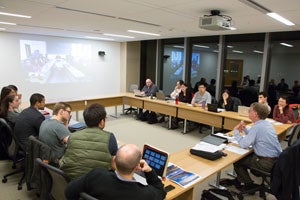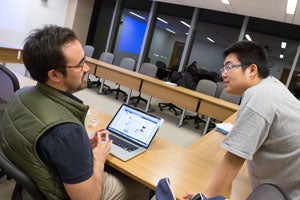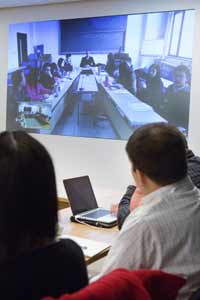It’s Wednesday night in Cambridge and Thursday morning in Beijing, and their seminar rooms are some 6,700 miles apart, but for 30 students from Harvard Law School and the Renmin University of China School of Law, common interests and videoconferencing equipment easily bridge these distances.
During this spring semester, students in a reading group taught by HLS Professor William P. Alford and an advanced negotiation skills class taught by Renmin Assistant Professor Alonzo Emery ’10 have come together electronically to consider the roles of China and the U.S. in a world order in flux. “The U.S.-China relationship is often touted as the most important relationship to manage ‘properly’ if we are to have the type of peaceful world envisioned by all of us in the course,” explains Emery. They were also joined for several class sessions by Han Dayuan, dean of Renmin Law School, and Ding Xiangshun, a Renmin professor currently at HLS as a Fulbright Scholar.

Alford, HLS’s vice dean for the Graduate Program and International Legal Studies, worked for more than a year to plan this foray into the electronic classroom—an idea that is beginning to take root at HLS through faculty initiatives, the Law School’s first EdX course (Copyright, taught this spring by HLS Professor and Berkman Center for Internet & Society Faculty Director William Fisher III), student interest, and strong advocacy by alumni, including Gus Hauser ’53. On the Cambridge side, the Harvard students sit around a horseshoe-shaped table in a fifth floor seminar room in Wasserstein Hall; the Renmin students, projected life-sized, look back at them from the fourth wall.
The topics under discussion have ranged from challenges, especially in law, facing the U.S. – PRC bilateral relationship, to human rights (exemplified through disability rights) and the role of lawyers in addressing these global concerns. “To exchange ideas and perspectives in such a frank and forthright environment is tremendously enriching,” says HLS student Henry Makeham LL.M. ‘13, adding that a course like this “helps both sides realize that our respective future lawyers, scholars, policy-makers, and business leaders believe—and are striving for—a robust rule of law.”

At a session in mid-March, the Renmin and HLS students turned their attention to China’s presence and investment in Africa, as a window into thinking about development. Explaining that “it is a subject of enormous importance both in itself and for what it tells us about China’s role in the world,” Alford invited half a dozen HLS graduate students—LL.M. and S.J.D. candidates from several African countries—to visit the class and offer additional perspectives. With Alford and Emery asking the group to draw on their own experiences, as well as the assigned readings, the ensuing discussion ranged from the reasons why the wealth of natural resources in some African countries could be a challenge instead of a boon, to the applicability of the Chinese model of development—described as one that put economic development first, with political reform to follow—to possible lessons for China about civil society and legal development. “This course really helped me to think bigger,” said Renmin student Kevin Wang; “I started to realize that there are many areas where I can be useful and a lot of legal skills I can use for causes beyond commercial lawyering.”
A few weeks later, the discussion centered, first, on the nature of regionalism and why different models (the EU, for example) do and don’t work. A Renmin student’s suggestion that regional integration is like a law school study group that lets some students in and keeps others out generated an international laugh, before the discussion turned to the World Trade Organization, the ongoing Trans-Pacific Partnership trade negotiations, and the repercussions of including or excluding China and the U.S. from regional trade agreements.
After an hour and a half of lively debate, Emery, who will return to HLS in July as a lecturer on law and clinical instructor in the Harvard Negotiation & Mediation Clinical Program, briefed the class on the negotiation exercise planned for the last class, which drew on a real-life dispute between U.S. and Chinese regulators over access to the audit workpapers of Chinese companies listed on American stock exchanges. Then the video cameras were turned off and the two sides began to confer, behind virtual closed doors, on their opening statements.
But it was a negotiation with a twist: the students at Renmin were asked to assume the role of the U.S. Securities & Exchange Commission, and the Harvard contingent to speak for the China Securities Regulatory Commission. One of Alford’s students, Cristián Rodríguez Chiffelle LL.M. ’13, was a lead negotiator for Chile’s Ministry of Foreign Affairs before coming to HLS, working on trade agreements with China and Hong Kong. As professional negotiators, he and his colleagues “always study China,” Rodríguez Chiffelle added, but “to have a class with Chinese students is quite unique. This was one of the highlights of my year.”
—Audrey Kunycky
